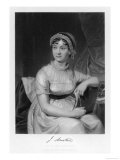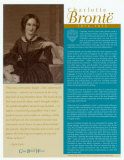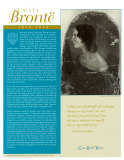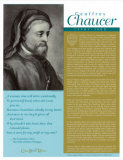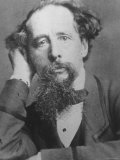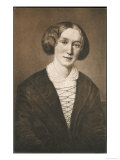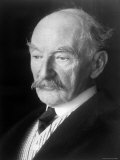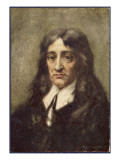|
|
|
|
|
Jane Austen
b. 12-16-1775; Steventon, Hampshire, England
d. 7-18-1817; Winchester, buried at Winchester Cathedral
“Mr. Darcy had at first scarcely allowed her to be pretty; he had looked at her without admiration at the ball, and when thay next met, he looked at her only to criticise. But no sooner had he made it clear to himself and his friends that she had hardly a good feature in her face, than he began to find it was rendered uncommonly intelligent by the beautiful expression of her dark eyes.” — Pride and Prejudice
|
|
|
|
Charlotte Brontë
b. 4-21-1816; Thornton, Yorkshire
d. 3-31-1855; Haworth, Yorkshire
"This was a demoniac laugh— low, suppressed, and deep— uttered, as it seemed, at the very keyhole of my chamber door. The head of my bed was near the door, and I thought at first the goblin-laugher stood at my bedside—or rather, crouched by my pillow: but I rose, looked round, and could see nothing; while, as I still gazed, the unnatural sound was reiterated: and I knew it came from behind the panels. My first impulse was to rise and fasten the bolt; my next, again to cry out, "Who is there?" — Jane Eyre
• Bronte Sisters posters
|
|
|
|
Emily Brontë
b. 7-30-1818; Yorkshire
d. 12-19-1848; Haworth, Yorkshire
Poster Text:“Nelly, I am Heathcliff! He's always, always in my mind; not as a pleasue, any more tha I am always a pleasure to myself, but as my whole being.” — Wuthering Heights
Poet and novelist Emily Jane Brontë was born in England in 1818, the fifth of six children. Her father was a clergyman and her family lived in a home on the moors, or swampy fields, in Haworth, Yorkshire. When Emily was three, her mother died, and she and her five siblings were raised by their father and their mother's sister, Aunt Branwell. In 1825, the four oldest Brontë daughers went to boarding school. Later that year, the two oldest sisters, Maria and Elizabeth, became ill and died. After this, Mr. Brontë educated his children at home. At this time, it was common for girls to be taught only the “accomplishments,” mainly sewing, cooking, art, and music – things that would prepare them to be successful housewives. It was not typical for girls to learn foreign languages, math, or geography. But Mr. Brontë treated all his children as intellectual equals and taught his daughters the same subjects he taught his son, Branwell. Mr. Brontë also isolated his children almost completely from the outside world for years. To amuse themselves, the sibling created make-believe kingdoms and wrote long stories and plays about imaginary characters. The children also explored the world around them, tramping through the moors near their home.
In her late teens, Emily spent time at various schools, both as a pupil and a teacher, but she disliked being away from Haworth. Many of the poems Emily wrote while away at school reflect her longing to be back home. In 1842, after the death of her Aunt Branwell, Emily returned to Haworth and took on the housekeeping duties. Emily enjoyed being near the moors she knew so well, and did her studying and writing at home. Her older sister Charlotte wrote that she often saw Emily kneading bread dough while studying from a book. Some of Emily's most famour poems were written around this time.
Emily, Charlotte, and their younger sister Anne spent much of their spare time writing. In 1846, the three Brontë sisters published a collection of poetry under male pen names. They hoped that their work would be received well if people thought it was written by men. However, the collection did not get good reviews and sold only two copies. Still, the sisters were determined to become writers. In 1847, each of them published a novel. Emily's book was Wuthering Heights, a dark story of love and revenge set on the moors of Yorkshire. Wuthering Heights tells the story of Heathcliff and Catherine, who fall in love but are kept apart by circumstances, selfishness, and pride. Critics did not like the book, calling it too dark, too harsh, and too intense. The following year, Emily died of tuberculosis. She was only 30 years old. In the years following her death, Wuthering Heights gained popularity, and today it is considered one of the masterpieces of 19th century English literature.
• Bronte Sisters posters
|
|
|
|
|
|
|
Charles Dickens
b. 2-7-1812; Portsmouth
d. 6-9-1870; Gad's Hill Place, Higham, Kent
“It was the best of times, it was the worst of times, it was the age of wisdom, it was the age of foolishness, it was the epoch of belief, it was the epoch of incredulity, it was the season of Light, it was the season of Darkness, it was the spring of hope, it was the winter of despair, we had everything before us, we had nothing before us...” — A Tale of Two Cities
• more Charles Dickens posters
|
|
|
|
George Eliot
née Mary Ann Evans
b. 11-22-1819; Arbury Hall, Nuneaton, Warwickshire, England
b. 12-22-1880; London
George Eliot was the pen name of Victorian author Mary Anne Evans. Her novels, known for their realism and psychological insight, were set in provincial England.
George Eliot quotes ~
• “Blessed is the influence of one true, loving human soul on another.”
• “Our deeds are like children that are born to us; they live and act apart from our own will. Nay, children may be strangled, but deeds never: they have an indestructible life both in and out of our consciousness.”
• “The important work of moving the world forward does not wait to be done by perfect men.”
• “Animals are such agreeable friends - they ask no questions, they pass no criticisms.”
• “Adventure is not outside man; it is within.”
• “It's never too late to be who you might have been.”
• “One must be poor to know the luxury of giving.”
• “So year after year, Silas Marner had lived in this solitude, his guineas rising in the iron pot, and his life narrowing and hardening itself more and more into a mere pulsation of desire and satisfaction that had no relation to any other being. His life had reduced itself to the functions of weaving and hoarding, without any contemplation of and end towards which the functions tended.”
• George Eliot at Amazon.com
|
|
|
|
Thomas Hardy
b. 6-2-1840; Stinsford, Dorchester, Dorset
d. 1-11-1928; Dorchester, Dorset
“The face of the heath by its mere complexion added half an hour to evening; it could in like manner retard the dawn, sadden noon, anticipate the frowning of storms scarcely generated, and intensify the opacity of a moonless midnight to a cause of shaking and dread.” — The Return of the Native
• Thomas Hardy at Amazon.com
|
|
|
|
|
|
|
George Orwell
b. 6-25-1903; Motihari, Bihar, British India
d. 1-21-1950; London
“Man is the only creature that consumes without producing. He does not give milk, he does not lay eggs, he is too weak to pull the plough, he cannot run fast enough to catch rabbits. Yet he is lord of all the animals. He sets them to work, he gives back to them the bare minimum that will prevent them from starving, and the rest he keeps for himself. Our labour tills the soil, our dung fertilises it, and yet there is not one of us that owns more than his bare skin.” — Animal Farm
• George Orwell at Amazon.com
|
|
|
|
William Shakespeare
b. 4-26-1564; Stratford-upon-Avon, England
d. 4-23-1616; Stratford-upon-Avon
“Good name in man and woman, dear my lord,
Is the immediate jewel of their souls:
Who steals my purse steals trash; 'tis something, nothing;
'Twas mine, 'tis his, and has been slave to thousands;
But he that filches from me my good name
Robs me of that which not enriches him
And makes me poor indeed.”
— Othello
• more Shakespeare posters
• Poetry Forms Posters
|
|
|
|
|
previous page | top
|
|
I have searched the web for visual, text, and manipulative curriculum support materials - teaching posters, art prints, maps, charts, calendars, books and educational toys featuring famous people, places and events - to help teachers optimize their valuable time and budget.
Browsing the subject areas at NetPosterWorks.com is a learning experience where educators can plan context rich environments while comparing prices, special discounts, framing options and shipping from educational resources.
Thank you for starting your search for inspirational, motivational, and educational posters and learning materials at NetPosterWorks.com. If you need help please contact us.
|
|
|
|







